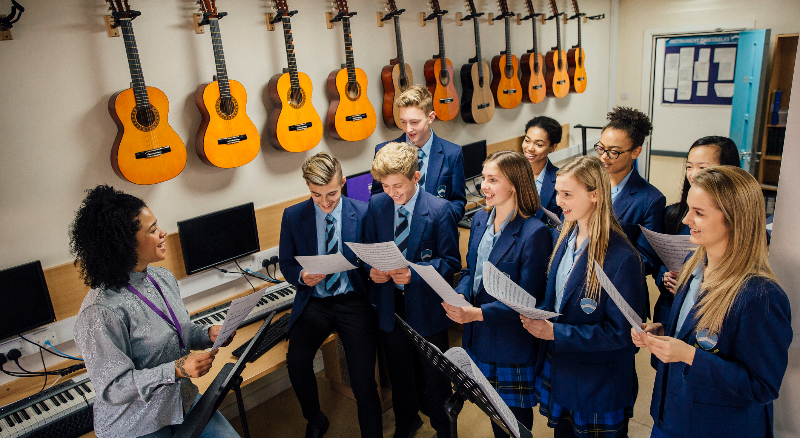

Music is so much more than notes on a page. It has the power to transform us, stay with us, and shape who we become.
When you choose to participate in your school’s choir or band, you not only improve your musical abilities but also develop some very important life skills like grit, patience, discipline, teamwork, and communication.
Participating in a musical group offers an ideal opportunity for personal and musical growth.
Joining a school choir or band places kids in a unique setting. Here, they must learn how to blend and adapt.
Of course, all students are there to learn to sing or play on key. Still, they also learn how to work together, collaborate, and serve others (they are, after all, performing for an audience).
Belonging to a musical group teaches resilience; young musicians must work hard and overcome tough challenges.
Ever hear a beginning band? Yeah, it’s like that.
But then, within a few short years, after the kid has made it through their thousandth squeak or has finally figured out what to do with a cymbal on their eighth-grade band trip, something magic happens.
They have grown, changed, and become more resilient, and they have an “I belong” to take with them on their next steps through life.

Making music with others is the perfect way to make friends.
Lifetime friendships often begin in the horn section of a band and the alto section of a choir. When you work as a team, you are all #inthistogether.
When you’re working towards a common goal, that’s when true bonds form.
Standing alongside friends in your high school music ensemble, you suddenly become aware and understand that you are part of something bigger than yourself.
You learn to listen to and blend with others to align your goals with those of the rest of the team. You discover that your success is tied to the success of the entire group.
These skills will serve well in any future career, whether you collaborate with coworkers or lead a project.

The research is clear: music education significantly impacts academic and cognitive abilities.
Participating in musical activities helps improve academic performance by developing important skills such as time management, concentration, and perseverance.
Studies show that students involved in music education tend to perform better academically compared to their non-musician peers and also show better cognitive development in areas like memory, attention, and problem-solving.
Success in other subjects is linked to the self-discipline developed in music class. The skills acquired while practicing challenging music can be applied when studying complex anatomical models.
Essentially, the places in the brain that deal with musical cognition produce tools such as memory, attention, and thinking skills.

Being part of a musical ensemble teaches us how to be better musicians and prepares us for life’s challenges.
We learn to express ourselves through music and, in turn, become more in tune with the emotions of those around us. This is hard for people who don’t play music to understand.
Being part of a band or choir makes you a better collaborator, a better friend, and—if you perform in front of audiences—a better person who can handle the bumps and bruises of life. Because every time you perform, you get a little more confident, and every time you’re a little more confident, you’re a little bit more likely to try new things and take on new challenges.

Music has the ability to heal. The brain has a special response to music, making it an avenue for improving mental health. Playing an instrument or singing provides a stress release.
One could also argue that really “getting into it” during a performance is a secret act of meditation. Whether done actively or passively, music enhances the mood and well-being of one’s life and mental state.

Whether you pursue music after high school or not, being in a band or choir imparts skills that can take you far in life.
Discipline is necessary for every musician, and discipline equals not just creativity but also consistency and diligence over the long haul.
Music is teamwork, whether in a large band or a small chamber group. You learn to make room for other voices, and even when the spotlight is on you, you’re in service to the music and your fellow musicians.
To sum up, joining a band or choir is not merely about acquiring the ability to play an instrument or mastering the art of singing in tune with others.
Rather, it is about establishing a cornerstone for a prospective life—a life either lived or projected into the future, where the path taken and the choices made will echo in and through the up and down, back and forth shuffles of time.
The life skills that the band or choir experience provides are immeasurable. “Be part of something greater than yourself.”
That’s what they told us.
At B Natural Pianos and Music School, we are excited to offer private music lessons for a wide variety of musical instruments.
We also provide instruction in music theory, songwriting, and composition, which can be taken as standalone courses or as part of your instrumental education. If you would like to learn more about our music education programs or enroll, please feel free to contact us.


